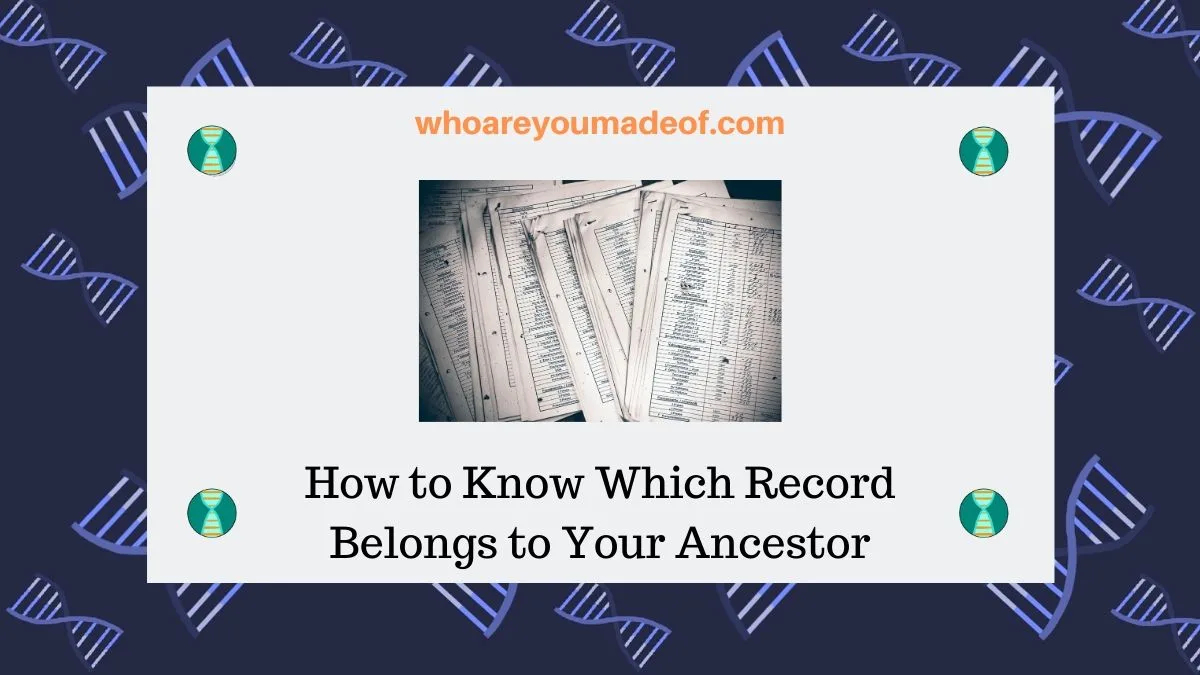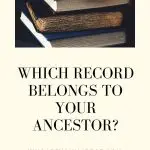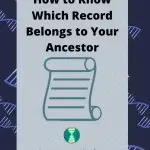If you are building your family tree, you have likely seen several documents with the same name as that of your ancestor. How to know which one to use? In this post, learn how to know which record belongs to your ancestor.
We definitely don't want to add the wrong information or document to our family tree. If we do, we might cause confusion to ourselves or someone else in the future.

Any small detail in genealogy is a clue that we can use to learn more about our ancestors. It is these small details that can sometimes send us off in the wrong direction on our tree, and this is an especially big risk if we choose to follow the wrong trail of documents.
If my ancestor's name is John Smith, and I see five different John Smiths on my search results, how do I know which one to choose? Each John Smith on the list has a different set of parents and a different birth date.
I certainly don't want to add the wrong John Smith to my tree! Imagine adding the wrong John Smith and then spending months (or years) researching his ancestors, only to find out later that I'm not even descended from him.
Below, I have compiled some tips about choosing which genealogy record belong to your ancestor when there are multiple people with the same name.
Check each record for details that you already know about your ancestor
You should carefully examine each document or record to compare them with information that you already know about your ancestors. It's important to not make any guesses when it comes to choosing a document, so only use information that you are pretty certain about.
Before choosing a record to examine, go through all of the documents and other information that you have collected about your ancestor in order to refresh your memory on the details you have already learned.
You can use the following details about your ancestor to compare with the documents you aren't sure about to find which one matches your ancestor:
- Complete name, including middle initial
- Unusual spellings
- Parents of your ancestor
- Relatives listed on document match known family members
- Place of birth or marriage matching known residence for your ancestor
- Exact match on vital record date (i.e. date of birth is an exact match)
- Same residence as previous record, as in the same residence as previous census record
- Same or similar occupation as previous records show (occupations can vary slightly over ancestor's career path)
- Religious document matches known religion of ancestor
- Location of death matches their last known residence or residence of one of their adult children
Even the information that we learned from family stories, which can often have elements of truth, or oral traditions being passed down can help us figure out which record likely belongs to our ancestor. Every clue is important!
Ideally, more than one detail from the document you choose matches your ancestor. The more proof that you can find that the document you think belongs to ancestor actually does belong to them, the better.
Eliminate records that don't belong to your ancestor based on negative information
Sometimes, you can use a process of elimination to decide which records don't belong to your ancestor. This is a good way to quickly discard some options and make your research a little easier.
For example, if I know that my John Smith ancestor was born and died in New Jersey, and was present in New Jersey for the US Federal Census every year, it is unlikely that a marriage record from New Mexico belongs to him. Even if the wife has the same, yet equally common name.
For example, if my John Smith married a Mary Brown, and I find a record like the one I mentioned above for a John Smith and Mary Brown marrying in New Mexico, it's probably the wrong couple. I need more than just names to be sure that the record is for the right person or people.
Just out of curiosity, I did a search on Family Search for John Smiths who married Mary Browns. There are at least eight couples who fit the description, and some of them are even in the same state.
If I add in the records where no last name is listed for the spouse of John Smith and only "Mary" is written, I can easily add ten more possible records to my list.
Details like middle names, or even middle initials, exact place of birth, and names of other relatives are crucial. Using this information, I can sort through these seemingly identical records to discard the ones that don't belong to the couple that I am researching.
Remember, if it seems wrong, it probably is. That is, unless you have additional documents that support the records belonging to your ancestor.
Public family trees don't count as source for details about your ancestor
I thought it important to mention that when we are trying to decide whether a record belongs to our ancestor, we avoid choosing a record based on information that we found in someone else's family tree. The only exception to this is whether the information that we found is backed up by a document or record that you have examined and determined is correct.
The internet is a lovely invention and it has helped make genealogy research much easier for those of us who enjoy the hobby. There are always downsides, however.
There are millions upon millions of errors in family trees that are on the internet. The nature of the internet makes it easy to mistakenly incorporate these errors into our own family trees.
This is why I suggest that we treat other family trees like a hypothesis or theory, and not a source. Other family trees are as reliable as a family story told by our Great-Aunt Sally and must be backed up by original sources.
No offense to Great-Aunt Sally, of course.
Conclusion
I hope that this post has helped you learn some techniques for figuring out which document belongs to your ancestor, and which records you should ignore. If you have any of your own tips that you'd like to share, please join us in the discussion below.
Thanks for stopping by today!



Joy Metcalf
Saturday 11th of October 2025
I generally reject out of hand any information found in family trees until I can go back and look at their sources. Too many times I've found information and even records that are obviously incorrect--such the the father of x being born only 5 years before his son. How could someone miss that obvious inconsistency! Yet, it happens all too often.
I note about middle initials--they're not always written in stone. l Census takers mishear, the person giving the information is guessing, etc. I look for matches, but have found that many times the middle initial changes with the record even while all other pertinent information is corroborated.
Bernadette
Monday 21st of February 2022
"Public family trees don’t count as source for details about your ancestor"
This is a crucial point that can't be emphasized enough. Don't accept any information that you can't confirm yourself.Some people just sling down possible matches as a working hypothesis. Treat them as such.
Bernadette
Sunday 18th of April 2021
Very useful information that needs to be restated every so often. Another thing to be aware of: An Ancestry hint of possible parents for an individual is just that — a hint, not a confirmed match. Someone with a tree that includes my great-grandmother claims that a certain couple (shown in an Ancestry hint) were her parents. Hoping she had proof, I asked how she knew for sure. All she said was, “because they are.” The possible parents in the Ancestry hint were born in Tennessee. According to two different census records, my great-grandmother’s parents were born in North Carolina and Georgia.
Clay Price
Sunday 18th of April 2021
Another excellent article, Mercedes. I wish I had seen this when I got serious about genealogy about 10 years ago. I found a reference to my great-great-grandfather at the battle of San Jacinto where Texas won its independence from Mexico. What a find! As I tried to confirm this information, I finally discovered there were two men with the same name who came to Texas at the same time and lived for a while in the same city! There was enough wrong information about the one who was at San Jacinto that I realized there were two different people. My research eventually uncovered the details of both men. Your article would have helped me be cautious about coming to an early conclusion that turned out to be wrong. As I became more involved with research, I also discovered many, many family trees with incorrect information! As a newcomer I had assumed family trees were solid. Again, your article would have helped me approach that type of resource with a skeptical eye until enough supporting documentation could be confirmed. I'm glad you are discussing these things. Your article will be quite valuable for others who are relatively new to ancestry research. And also a reminder to those of us with a higher level of experience not to let our guard down.
Mercedes
Sunday 18th of April 2021
Thank you for your kind words, and for reading my articles :) I'm so glad that you discovered the right Texan ancestor. Sincerely, Mercedes